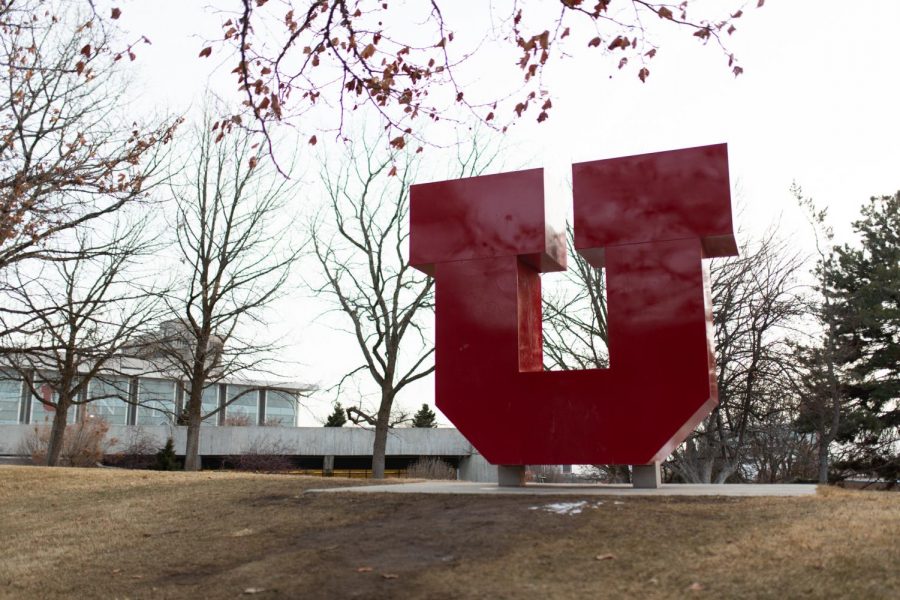Food Sovereignty Panel Kicks Off Earth Week 2023 at the U
Evening on University of Utah campus, Thursday in Salt Lake City. (Photo by Maya Fraser | The Daily Utah Chronicle)
April 18, 2023
To kick off Earth Week 2023, themed “Indigenizing Utah,” the Environmental Humanities Program, Sustainability Office and American Indian Resource Center at the University of Utah held a panel discussion about food sovereignty.
The moderator was Darren Parry, former chairman of the Northwestern Band of the Shoshone Nation and professor of Native American history at Utah State University.
“Historians have always had an easy time connecting the dots on what effect colonization had on the Indigenous communities across the country,” Parry said. “But what is seldom ever talked about is the effects of colonization upon the food.”
Parry talked about food weaving people together, saying, “I want Native Americans and others to get to know their food heritage.”
The panelists included Rios Pacheco, a cultural teacher for the Tribal Child Care Program with the Northwestern Band of Shoshone, Kristie Hinton, a registered dietitian with the Urban Indian Center of Salt Lake and Denae Shanidiin, a co-creator of the community garden Carry the Water and organizer with MMIWhoismissing.
Pacheco explained his mother would gather pine nuts and chokecherries in the fall while his father would grow The Three Sisters: corn, squash and beans.
“The most important thing is bringing spirituality into your farm, into your gardens, into your food life, but that’s the same thing the colonizers brought here in Utah,” he said. “They depended on that faith, we didn’t depend on it. We knew it was part of us.”
To Pacheco, food sovereignty means having the right to grow the same foods his ancestors once grew.
“We’re here as elders to come and teach those things that we have gone through and now we’re passing them on,” Pacheco said. “And it’s just like that plant, those parts that are already passed and have its use, they go back into the ground again and replenish the ground, so other vital plants and vital nourishment will come back again.”
Shanidiin spoke of Missing and Murdered Indigenous Women, saying everything is connected.
“So when I think about why food sovereignty is really important, I also connect it back to our sovereignty of self, sovereignty in our own bodies,” she said. “And then our communities and really addressing the harms that happen.”
In Hinton’s first week of college, one professor taught that “food is the chemicals we eat.” Hinton said that while he was right, he was also really wrong.
“Food is not just chemicals that we eat, it’s our tradition, it’s love, it’s how we were parented, it’s our finances, it’s how I’m parenting my own children, it’s a feeling of safety,” Hinton said. “And so as a dietitian, lots of times I’ll start talking to people and we get into things like suicidal ideation and trauma and anxiety. And people say, ‘you’re not a social worker.’ No, but food is all of that.”
Parry asked the panelists about the ways non-Indigenous allies can support efforts to revitalize Indigenous food. Shanidiin said, “recognizing that we exist.” She continued to say that non-Indigenous folks need to heal their own relationship with perpetuating colonization. “And I think when we alleviate some of those harms on Indigenous and within Indigenous communities, which is the work that should be done by settlers, you’ll really start to see things grow,” she said. “People grow, plants grow, communities grow.”
Hinton recommended buying food and seeds produced by Indigenous people, citing Native Seeds/SEARCH, a nonprofit seed conservation organization located in Arizona. Their mission is to “conserve and promote the arid-adapted crop diversity of the Southwest in support of sustainable farming and food security.”
One audience member asked how to grow a garden using Native plants without furthering colonization.
“We have to sit with that uncomfortability, we have to sit with the knowing of the space that you take up on stolen land,” Shanidiin said. “But there are ways for you to be in kinship, in a good way. You know, weaponize your privilege, show up to things, donate money.”
Another person asked about the barriers faced by being pushed onto land that isn’t one’s own.
Pacheco talked about Boa Ogoi, the site of the Bear River Massacre, “the largest mass murder of Native Americans in the history of the United States.” Currently, the Shoshone people are working with graduate students from Utah State University’s Climate Adaptation Science program to restore the ecology of Boa Ogoi.
“So we’re trying to get it back to where it was when our people were there, but at the same time, we remember our people by restoring those plant names,” he said. “Our people recognize those plant names, but we also know that we cannot do it alone because we’re all people, all people need help to restore things. So we are going out and receiving that help.”
A final audience member talked about having conversations with people who say that because of the status of the shrinking Great Salt Lake, humans shouldn’t inhabit this land anymore, asking about how this concept relates to food sovereignty.
Shanidiin said that response comes from a colonized perspective, and it is important to have a different relationship with nature and water to solve the lake’s issues. When she hauls water with her grandfather, for example, “there’s a physicality to it.”
“I’m seeing how much I’m using,” she said. “It’s very precious to me. I go home and I don’t waste it.”
Visit the U Sustainability Office’s website for information about other Earth Week events.








